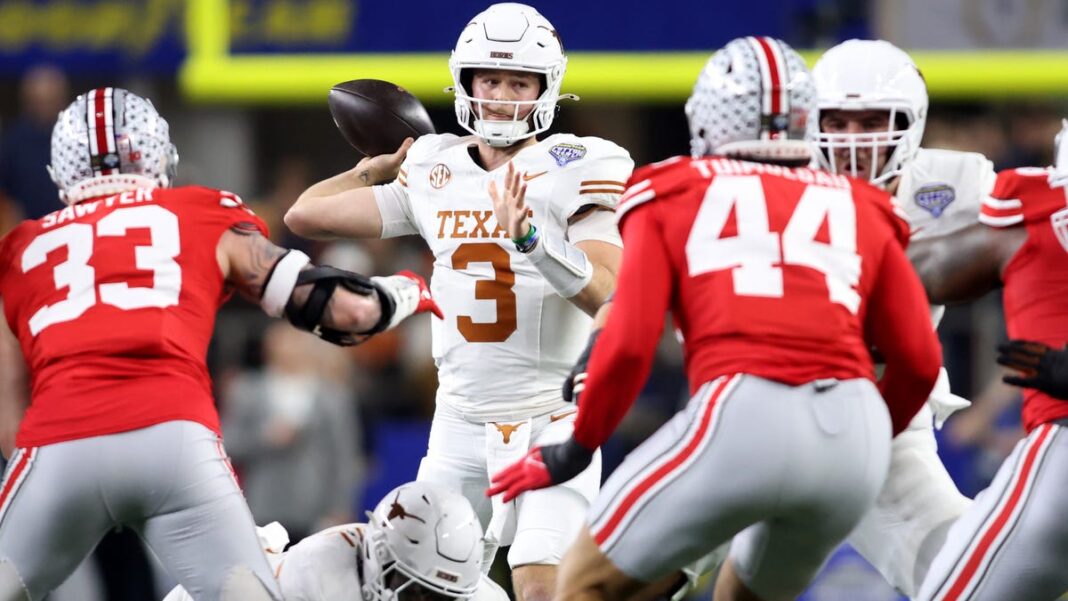Texas QB Quinn Ewers Faces NFL Draft Choice: College Football Earnings in 2025 May Be Higher
Quinn Ewers has some time to decide if he will enter the NFL draft, with a deadline coming this Wednesday. For now, his focus is on finances.
Big, record-breaking, seven-figure finances.
We’re at a point where college football players can potentially earn more by staying in school rather than opting for the NFL draft early.
“Falling short for two years has been challenging,” Ewers expressed after his team, the Longhorns, lost in their College Football Playoff semifinal against Ohio State, leaving him once again one game away from the championship.
But now, a whole new opportunity is emerging — one that promises both a new team and substantial financial gain.
Players not competing in the national championship can declare for the NFL draft until Wednesday. Ewers and his team have less than 48 hours to negotiate the best offer for an All-American quarterback.
This should not be too challenging.
Ewers’ chapter with Texas is closing, and the Longhorns are set to move forward with their highly-rated backup, Arch Manning, in 2025. However, Ewers has plenty of options despite a decline in his draft prospects throughout the season.
Previously seen as a potential first-round pick, Ewers is now looking at a mid- to late-round selection. In past years, such a drop in draft status would have meant a considerable decrease in earnings; that’s no longer the case thanks to the surge in NIL deals and “pay-for-play” agreements starting in the 2025 season.
In the 2024 draft, the first quarterback chosen outside of the first round was Spencer Rattler, who landed with the New Orleans Saints in the fifth round. This aligns closely with Ewers’ current projections.
Rattler landed a four-year contract worth $4.35 million initially, which averages out to approximately $1.08 million annually. On the college football market, Ewers might earn four times that figure for just one year of play.
Recently, Carson Beck, the former Georgia quarterback, declared he was staying in college after initially considering the NFL draft, opting to transfer to Miami. Sources mentioned his one-year deal is valued at around $4 million, potentially more with incentives.
If Ewers explores the college football market, numerous prestigious and financially robust programs, including Ohio State, Georgia, and Southern California, will undoubtedly be vying for his attention, all capable of extending him an appealing offer.
And why would he say no?
Unless someone is sure of being a first-round pick, entering the NFL early might not be worthwhile. Especially for a top-tier QB with playoff achievements on his record.
The age-old reasoning that a player risks injury leaving college doesn’t hold much weight anymore. The same threat exists in the NFL.
Moreover, players can secure disability insurance to safeguard their future income, with some policies potentially offering payouts as high as $5 million.
Stars like Travis Hunter and Shedeur Sanders from Colorado opted to play in a bowl game, partly due to their extensive insurance coverage, reported to be the highest ever for a college athlete, as noted by Coach Deion Sanders.
Ewers could secure a similar arrangement along with a lucrative one-year contract. From a financial standpoint, not returning to college football in 2025 would be unwise.
In every aspect, playing college football in 2025 will bring Ewers better financial rewards than an NFL career at this stage. He’d also have the chance to choose his future team, potentially one ready for a championship run.
Being a backup in the NFL means waiting for an opportunity; he can do that anytime—there’s no immediate rush.
For an NFL reference, consider Mac Jones, who was drafted in the first round by the New England Patriots in 2021 but now serves as a backup in Jacksonville.
Jones was awarded a lucrative rookie contract that, even now, surpasses anything Ewers could get in college but, given the current situation, Ewers won’t secure that kind of deal as a first-round pick.
Even if Ewers were picked in the second round, he’d still earn more by staying in college. For example, Will Levis was drafted second overall in the second round by the Tennessee Titans in 2023, with a deal worth $9.5 million over four years—averaging $2.38 million annually.
Ewers could almost double that annual figure during one season of college football.
Taking this path allows Ewers to play the long game, maximizing his earnings in college while aiming to enhance his draft position for the 2026 NFL draft. This marks perhaps the simplest decision he has faced since leaving Ohio State after his freshman year to fulfill his dreams at Texas.
This isn’t about school loyalty or sentiment; Texas is moving on, and Ewers should too.
He’s now positioned as a mercenary in college football, which is perfectly acceptable. Seeking out a new home, cashing in, and boosting his draft appeal is the way forward.
And perhaps he can even chase a national title along the way.
Matt Hayes is the senior national college football writer for YSL News Sports Network. Follow him on X at @MattHayesCFB.

